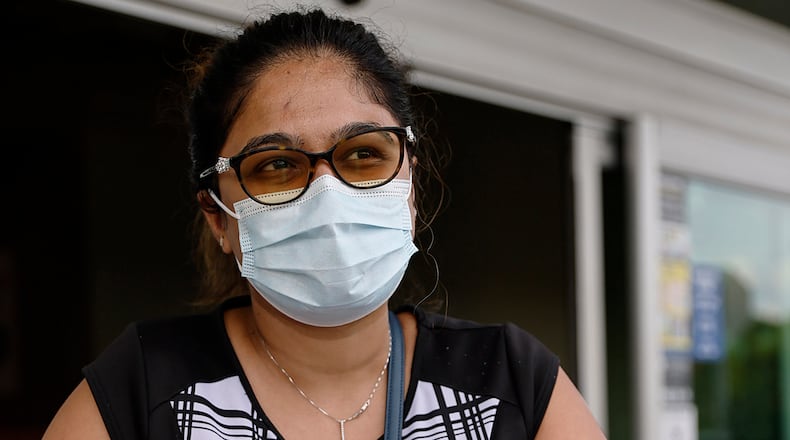You read about it on social media. You see it when you go shopping, or out to a restaurant in the Atlanta metro area. And several recent, national polls confirm: as we enter the pandemic’s third summer, Black and Latino people are much more likely to continue wearing masks in public or show support for wearing masks than white, non-Hispanic people.
In two polls, there is a sizable gap between Black and Latino respondents, on the one hand, and white respondents, on the other, with Black respondents being much more likely to favor masks.
People notice the split on the street and online, in Atlanta and elsewhere. “In the area where I live, (metro ATL), I see more AA [African-American] citizens wearing masks that anyone else,” an Atlanta resident recently tweeted. “Black people and POC [People of Color] are staying masked and some white people” on the metro, a Washington, D.C. resident observed on the same site last week. A doctorate in sociology candidate at the University of Buffalo wondered on Twitter, “Has anyone done a study on how Black ppl are largely still wearing masks despite what the CDC says?”
“I wear a mask everywhere I go,” said Tami Smith, a 60-year-old Black woman who had just done some grocery shopping on Friday afternoon in Dacula, Gwinnett County. “To church, the grocery store. Normally, I wear two.” Her sister’s wife died of COVID, likely because someone at her sister’s house wasn’t wearing a mask, she said. A data analyst who is unvaccinated, one place she said she doesn’t have to wear a mask is at her job, because she works from home.
In the surveys, the gap is sharpest between Black and white respondents: an AP-NORC Center for Public Affairs Research poll from April found that 71% of Black Americans favored requiring face masks for people traveling on public transportation, compared to 59% of Hispanics, and 52% of white, non-Hispanics. The poll surveyed 1,085 people, with a margin of error in the total sample of 3.9%. Another poll by the Kaiser Family Foundation (KFF) from this spring found that a total of 81% of Black Americans surveyed said they wore a mask all or most of the time when “indoors in public places,” compared to 65% of Hispanics and 39% of white, non-Hispanics. Kaiser’s poll surveyed 1,243 adults, with a margin of error of at least 4%.
Although the AP-NORC and KFF surveys register the phenomenon, they don’t ask why. A growing body of research points to two possible explanations: first, Black people perceive greater risk when it comes to COVID-19, having experienced higher rates of infection, hospitalizations and death — as well as greater economic and mental health impacts. And second, on discovering the pandemic’s disproportionate impact on Black and Latino people, white people became less likely to see the need for protecting themselves by wearing masks.
“What we see is, the more [white] people perceive there to be racial disparities in impact, the more likely they will not be in support of mask-wearing,” said Allison L. Skinner-Dorkenoo, UGA psychology professor and co-author of a recent study by members of the university’s psychology department. The study involved asking written questions of 500 white participants and concluded that, if white people believed that COVID posed a greater threat to Black and Hispanic people, they were less afraid of the virus and may be less likely to wear a mask themselves.
Similarly, Berkeley Franz, community-based health professor at Ohio University, led a study that found white people living in areas of the country where Black and Latino people were dying from the virus at higher rates were less likely to wear masks — and that “mask usage increased when White death rates relative to Black and Hispanic rates increased.”
“I was interested in to what extent Americans are willing to do things that benefit others,” Franz said.
The most recent polls mirror others taken earlier in the pandemic that found the same divide toward precautions, said Amelia Burke-Garcia, public health program director at NORC at the University of Chicago. “We saw attitudes toward the protocols that are needed to get back to ‘normal’ — such as wearing masks in public and vaccines for children — supported among Black and Latino respondents,” she said. (Asian-Americans and Native Americans were not surveyed in these polls.)
“What we see is, the more [white] people perceive there to be racial disparities in impact, the more likely they will not be in support of mask-wearing."
Meanwhile, “the lack of federal guidance on mask-wearing has turned into an individual level of intervention,” said Dr. Oni Blackstock, an HIV physician and founder of Health Justice, a health equity consultancy. “I’m not surprised at the poll findings, thinking about which communities are more at risk.”
Black and Latino communities suffering more deaths, proportionally, creates a “demographics of loss,” said Keri-Leigh Merritt, historian and co-editor of a forthcoming book, “After Life: A Collective History of Loss and Redemption in Pandemic America.” This loss “will affect you and make you take precautions much longer.”
At a shopping center in Dacula, Gwinnett County, on Friday afternoon, much less than half the dozens of shoppers had masks on, and most of those were African-American women. Those who agreed to talk to the AJC said they had experienced a loss from the pandemic.
Tami Smith had adopted more of an a la carte approach to the menu of protections against COVID -- she used masks, but hadn’t been vaccinated -- rather than the all-of-the-above approach recommended by medical science. “I’m sure a lot of Black folks are vaccinated,” she said. “I’m just not one of them.”
Credit: Natrice Miller / Natrice.Miller@ajc.com
Credit: Natrice Miller / Natrice.Miller@ajc.com
“My whole family still wears masks,” said Nickie Tingle, 38, adding, “I will take off the mask in some restaurants.” Her teenaged daughter got sick with COVID late last year, and “brought it home — we all got it.” She also was not vaccinated, because she is breastfeeding, and “no doctor could tell me what would happen” if she got the shot.
Asked about the surveys, she said Black people “were the most infected when it first happened, and it made us want to protect ourselves.”
Kruti Pandya is 34; she lives in nearby Auburn with in-laws in their 80′s, so she is “very careful.” Pandya has lost a few members of her extended family to COVID. “No one’s wearing a mask now; it’s the new normal... I wear mine, do my sanitizer. It’s up to individual responsibility.”
Kathy Carey wears her mask in most public places, although not at church, where fewer people are going since services went online and those who go in person sit six feet apart. She also doesn’t mask at her community’s gym, because “not many people go there.” Carey, 62, also hadn’t been vaccinated. “I’m not doing vaccines,” she said. “I don’t trust them.”
“I’ve made my own decisions,” she added.
Credit: Natrice Miller / Natrice.Miller@ajc.com
Credit: Natrice Miller / Natrice.Miller@ajc.com
Black and Hispanic Americans were vaccinated at lower rates than whites during the initial rollouts of the vaccines, but that gap has greatly narrowed and even reversed in the case of Hispanics.
Charla Ruschelle is a Black fashion designer in Atlanta who has been selling masks she makes since March 2020, when the World Health Organization first declared a pandemic. She’s sold at least a thousand, she said. Two-plus years later, she’s perplexed by friends who aren’t wearing masks and say, “‘I already got COVID.’ I tell them, ‘I haven’t gotten COVID and I’m not trying to.’”
Ruschelle hopes African Americans continue to wear masks. “I want us to be around. I don’t want something we can prevent to take us out.”
The Atlanta Journal-Constitution and Report for America are partnering to add more journalists to cover topics important to our community. Please help us fund this important work at ajc.com/give
About the Author
The Latest
Featured



